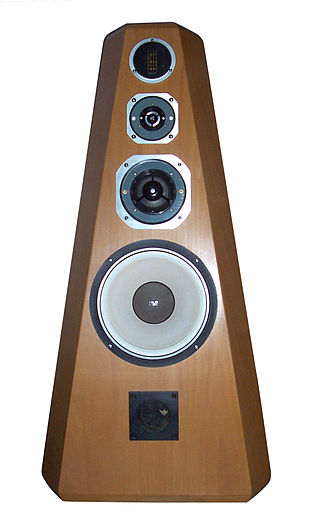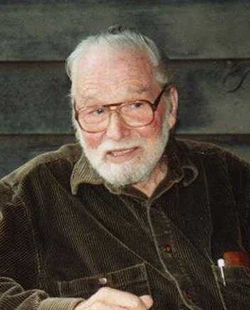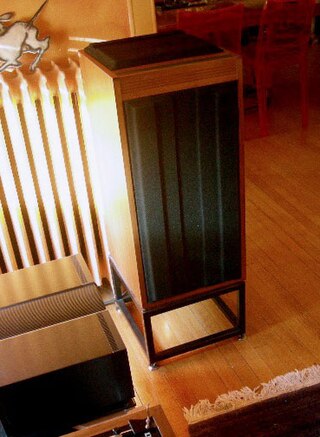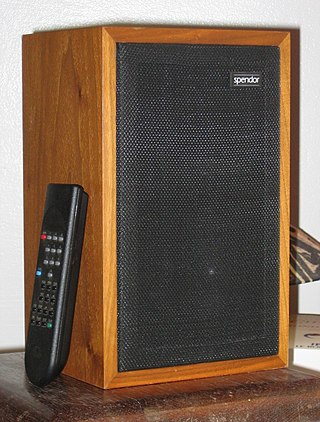Related Research Articles

High fidelity is the high-quality reproduction of sound. It is popular with audiophiles and home audio enthusiasts. Ideally, high-fidelity equipment has inaudible noise and distortion, and a flat frequency response within the human hearing range.

An audiophile is a person who is enthusiastic about high-fidelity sound reproduction. The audiophile seeks to achieve high sound quality in the audio reproduction of recorded music, typically in a quiet listening space in a room with good acoustics.
Linn Products is an engineering company that manufactures hi-fi and audio equipment. Founded by Ivor Tiefenbrun in Glasgow, Scotland, in 1972, the company is best known as the manufacturer of the Linn Sondek LP12 turntable.

Naim Audio is a British hi-fi manufacturer based in Wiltshire, United Kingdom.
Roksan is a British manufacturer of high fidelity audio products for domestic use, based in Rayleigh, Essex. It is best known for its influential and innovative design for hi-fi equipment, and in particular its Xerxes platform for playing LP records.

Julian Charles Prendergast Vereker MBE was an English self-taught designer of audio equipment, and the founder of Naim Audio Ltd. of Salisbury, Wiltshire. He was an influential figure in the manufacture and retail of British high-fidelity audio equipment in the 1970s and 1980s.

Acoustic Research was a Cambridge, Massachusetts-based company that manufactured high-end audio equipment. The brand is now owned by VOXX. Acoustic Research was known for the AR-3 series of speaker systems, which used the 12 in (300 mm) acoustic suspension woofer of the AR-1 with newly designed dome mid-range speaker and high-frequency drivers. AR's line of acoustic suspension speakers were the first loudspeakers with relatively flat response, extended bass, wide dispersion, small size, and reasonable cost. The AR Turntable remains a highly sought vinyl record player.
Musical Fidelity is a British producer of high-end audio equipment focusing on streaming music players, and its core product range of amplifiers of various types. Other products have included headphones, Digital-Analog Converters (DACs), CD players, Bluetooth Receivers, ‘all-in-one systems’. Founded in the United Kingdom in 1982, they are known for their unusual industrial design, Nuvistor tube use and Class-AB amplifiers.

The Linn Sondek LP12 is a transcription turntable produced by Glasgow-based Linn Products, manufacturers of hi-fi, home theatre, and multi-room audio systems. Its name is derived from the 12" vinyl LP.
Rekursiv was a computer processor designed by David M. Harland in the mid-1980s at a division of hi-fi manufacturer Linn Products. It was one of the few computer architectures intended to implement object-oriented concepts directly in hardware, a form of high-level language computer architecture. The Rekursiv operated directly on objects rather than bits, nibbles, bytes and words. Virtual memory was used as a persistent object store and unusually, the processor instruction set supported recursion.

Edgar Marion Villchur was an American inventor, educator, and writer widely known for his 1954 invention of the acoustic suspension loudspeaker which revolutionized the field of high-fidelity equipment. A speaker Villchur developed, the AR-3, is exhibited at The Smithsonian Institution's Information Age Exhibit in Washington, DC.
THIEL Audio was an American privately held high performance loudspeaker manufacturer founded in Lexington, Kentucky, but later based in Nashville, Tennessee. Thiel Audio products were distributed to over 30 countries. All products by the founders were designed and built in their 35,000-square-foot (3,300 m2) facility located in Lexington. Thiel ceased operations in 2018.
KEF is a British company specialising in the design and production of a range of high-end audio products, including HiFi speakers, subwoofers, architecture speakers, wireless speakers, and headphones. It was founded in Maidstone, Kent, in 1961 by a BBC engineer named Raymond Cooke (1925–1995). In 1992, the Hong Kong–based Gold Peak Group acquired KEF; and GP Acoustics, a member of Gold Peak, now owns the company. KEF continues to develop and manufacture its products in Maidstone.

The Roksan Xerxes transcription turntable is a record player named after the Persian king Xerxes I and produced by London-based Roksan Audio. Designed by Roksan co-founder, Touraj Moghaddam, the Xerxes is a belt-driven turntable with a solid plinth. Launched in 1985, the sound quality of the product positioned it as a strong competitor against the established industry leader, the Linn Sondek LP12. Many reviewers use the Xerxes as a reference turntable.

The Rega Planar 3, together with its successors, the P3 and RP3, is a well-known budget audiophile turntable by British hi-fi manufacturer, Rega Research available since 1977. It was a belt-drive deck that broke from convention, by employing a solid plinth in lieu of the compliantly suspended chassis or sub-chassis used in many quality turntables since the early 1960s.

The Linn Isobarik, nicknamed "Bariks" or "Briks", is a loudspeaker designed and manufactured by Linn Products. The Isobarik is known for both its reproduction of low bass frequencies and being very demanding on amplifiers.

The LS3/5A is a small studio monitor loudspeaker originated by the BBC for use by outside broadcast vans to ensure quality of their broadcasts. The speaker concept set out transparent and natural sound as the goal, and the achievement of the result is widely acknowledged.
Spencer Hughes (1924–1983) was an English audio engineer who worked at the BBC research department in the 1960s. He founded Spendor to manufacture loudspeakers incorporating results of his research.
Spendor is a British loudspeaker manufacturing company founded in 1969 by audio engineer Spencer Hughes (1924–1983) and his wife Dorothy. It is located in East Sussex. The name was derived from the first names of both.
References
- ↑ Lander, David (30 November 2003). "Ikonoklast: Linn's Ivor Tiefenbrun". Stereophile
- ↑ Tiefenbrun, Sara. "#war #business #backstory". www.linkedin.com. Retrieved 5 May 2024.
- 1 2 "Ivor Tiefenbrun, MBE" Archived 2 December 2013 at the Wayback Machine . Power Lunch Club
- ↑ Hardesty, Richard (2006). "An Interview With Ivor Tiefenbrun" Archived 3 December 2013 at the Wayback Machine . Audio Perfectionist Journal
- ↑ Linn LP Playing System, Michael Fremer, Stereophile , November 2003
- ↑ Dudley, Art (30 June 2011). "Listening #102. Stereophile
- ↑ Youman, Robert S. (March/April 2012). "Vienna Acoustics – The Music Loudspeakers" Positive Feedback.
- ↑ John Atkinson & Robert Harley, A Wee Dram of Scotch: Linn Products' Ivor Tiefenbrun, Stereophile, October 1994
- 1 2 3 4 Vass, Steven (18 July 2010). "'How close were we to going bust? One hates to speculate. Really close...'". Sunday Herald . Archived from the original on 20 October 2014. Retrieved 26 March 2022.
- 1 2 "Ivor Tiefenbrun Reveals Why He Founded Cure Crohn’s & Colitis". Cure Crohn's Colitis, September 2012
- ↑ "Cboe's Natan Tiefenbrun takes on newly expanded role as president of North American and European equities - The TRADE". www.thetradenews.com. Retrieved 22 November 2024.
- ↑ "Interview with Sara Tiefenbrun, The School of Life Melbourne". The Bulb 16 March 2013
- ↑ Bannerman, Luc (4 October 2005). "Hi-fi tycoon turns to fighting disease Linn Products founder sets up charity to study Crohn's". The Herald (Glasgow)
- ↑ "Ivor Tiefenbrun MBE 2011". Entrepreneurial Exchange.
- ↑ "Plain Speaker". The Engineer, 7 February 2003
- ↑ "Tory candidate steps down over Scots Thatcher slur". BBC News, 6 October 2010